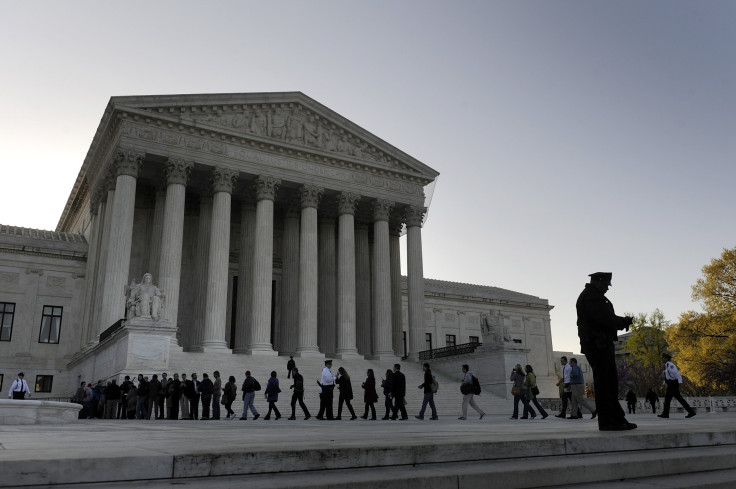Supreme Court Cases: In Big Win For Corporations, High Court Puts Severe Limits On Class Action Cases

The U.S. Supreme Court Thursday hammered another nail in the coffin of class-action litigation by stopping a class-action suit against American Express -- and handing a big win to corporations hoping to stave off future class-action cases.
In a split 5-3 decision that divided the liberals and conservatives on the court -- liberal Justice Sonia Sotomayor had recused herself -- the court held that under the Federal Arbitration Act, individual arbitration agreements could not be waived in favor of class actions even if the cost of individual arbitration is prohibitive. The decision has huge implications for the future of class-action suits, which largely exist to allow plaintiffs to pursue claims collectively when it is too expensive to do so individually.
In 2003, a group of merchants brought an antitrust class action against American Express, alleging that the credit card company had used its monopoly power to extract exorbitant fees in violation of federal antitrust law. American Express pointed to the individual arbitration agreements signed by each merchant as grounds to dismiss the suit. The merchants argued that forcing individual arbitration would effectively let American Express off the hook for its antitrust violations.
Writing for the conservative majority in American Express Co. et al. v. Italian Colors Restaurant et al., Justice Antonin Scalia held that the high cost did not effectively prevent the plaintiffs from bringing a claim, even though the cost of bringing individual claims was thought to be much higher than the payout they would receive if they won. “[A]ntitrust laws do not guarantee an affordable procedural path to the vindication of every claim,” Scalia wrote.
The effect of Thursday’s ruling could be to essentially prevent class actions seeking to enforce federal laws. Paired with a previous decision two years ago that crippled the ability to bring class actions for state law claims – also written by Scalia -- the Supreme Court has laid the groundwork for shutting the door on nearly all class-action cases – and letting corporations off the hook for violations of anything from antitrust to anti-discrimination laws.
“I think it’s a huge deal and a huge win for corporations,” said Brian Fitzpatrick, a class-action expert at Vanderbilt School of Law. “The Supreme Court seems to be saying, ‘as long as you use arbitration agreements, you can get rid of class action liability.’”
Fitzpatrick noted the possibility that subsequent rulings could permit class actions for newer federal laws, such as employment discrimination claims, since the antitrust laws at issue in American Express predate the class action statutes. But “I wouldn’t hold my breath,” he said. “This is another big step down the road of eliminating class-action liability.”
At issue is the enforceability of arbitration agreements, which businesses nearly always have the opportunity to force consumers and employees – those who might one day join a class action suit -- to sign. After Thursday's ruling, Fitzpatrick believes all business contracts will begin to preclude class-action claims. “I predict in the next few years, there’s no reason why every company in America is not going to make everyone who could possibly sue in a class action agree to not bring class-action suits.”
Over the past several years, a series of Supreme Court rulings have limited the ability to bring class actions and have generally divided the justices along ideological lines. “It’s a partisan issue,” said Fitzpatrick, who, it happens, once clerked for Scalia. But in recent years, the court has been “throwing out the baby with the bathwater.”
“It is a good thing to have class actions because you do want companies to internalize the costs of the harm they cause people,” he said.
© Copyright IBTimes 2024. All rights reserved.





















